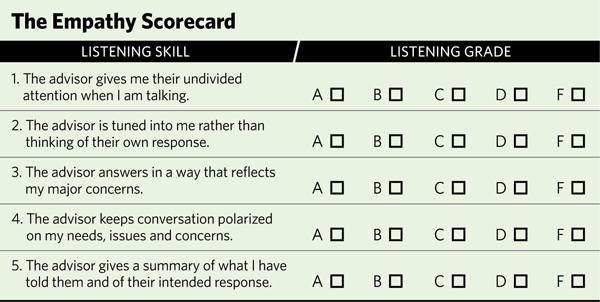D – Defensiveness: If someone doesn’t agree with our advice or ideas, the first impulse is to become emotionally agitated and defend our view and opinion. This builds a wall between us and hobbles our ability to listen.
“He just doesn’t listen!” said one woman to me as she explained why she had just changed 401(k) vendors for her company. “I would look this guy in the eye and tell him what I wanted and needed, and he would just continue to push his own agenda. Obviously, this was not about us for him; so we switched. And technically, he probably has a slightly better product. But I can’t deal with the lack of understanding anymore.”
It would hardly be possible to quantify how much money is lost and left on the table by people with poor listening skills, but be sure it would be in the billions. As individuals, we must ask ourselves how much a lack of listening might be costing our business. Is it possible that some of our clients—ones we assume are satisfied with the way we communicate—would say they are not so satisfied? The safest premise we can operate from is this: “I can always do a better job of listening.” It’s better to take that attitude, because it will safeguard us from smugness, arrogance and the sort of hubris that causes important relationships to fail.
Those who possess excellent inquiry skills are usually curious and genuinely interested in others by nature. Yet they have also learned that these skills must be purposefully developed with practice and good habits.
The Empathy Report Card
If your clients were allowed to fill out a listening skills report on you, how well do you think you would score? Consider designing a scorecard like the one below.

The reality is that clients and prospects won’t give you this sort of report card—they will just go elsewhere! Therefore, we must simply develop a mindfulness and awareness about superior listening skills. If you want to be pulled into the same orbit as your clients, you’ll need to pay closer attention when they talk and to how “tuned in” your responses are to the actual content of what they are saying. If you are expecting clients to follow your lead simply because of your flash and brilliance, then ask yourself how far you would follow a shooting star?
The following words by Søren Kierkegaard may be some of the most incisive and penetrating thoughts ever penned on the posture your ego must assume if you are to truly help people make progress:
“If one is truly to succeed in leading a person to a specific place, one must first and foremost take care to find him where he is and begin there.








